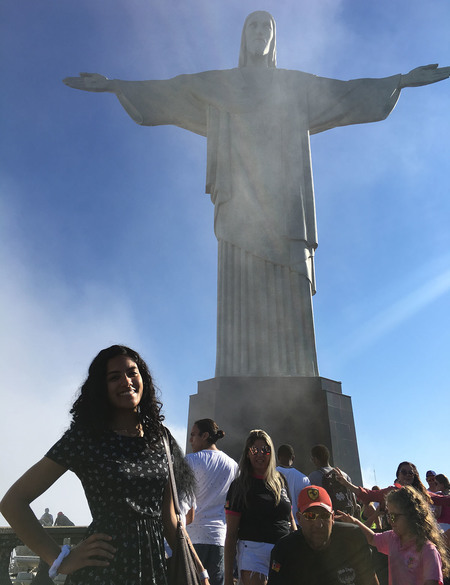Finding a common language through dance in Brazil

Godsee Joy is a senior from Silver Spring, Maryland, currently studying economics and peace studies with a minor in data science. While at the University of Notre Dame, she has been heavily involved with research, community engagement, and international travel. Currently, she serves as a department director in student government. She’s also a Kellogg International Scholar, a Balfour-Hesburgh Scholar, a project development intern for the Wilson Sheehan Lab for Economic Opportunities (LEO), and a writing center tutor. Joy participated in the international economics study abroad program in Germany in 2017. This past summer, she participated in the Brazil summer study abroad program, where students develop an in-depth understanding of the social, ethnic, and cultural mosaic that makes up Brazil. She reflects on her experience and the moment she found herself connected to the community despite language barriers and cultural differences.
I take a deep breath. Fruity, tropical aromas float in the humidity in São Paulo. Laughter and chatter drift in through the windows of “4YOU2,” a local nonprofit. Sandals slap the concrete outside as children chase each other, playing football.
I’m nervous.
4YOU2 is on the outskirts of the city, near a favela. Though the organization welcomed us warmly, I felt that I was intruding on their community, that we came to “observe” the children learning English there. There was an implicit power dynamic in our presence there as Americans fluent in English while they learned to “catch up.”
But then there was the drum class.
Another organization was using the community space to teach a drum class to elementary and middle school children. At one point, they made a drum circle and invited us to dance.
In dance, moving to the rhythm is critical – understanding language becomes secondary. One girl’s face lit up in the circle and she immediately, daringly challenged some of us to a dance off. And dance we did. We could not understand each other if we spoke, but our body language, our shared love of music and dance in this moment, created a special bond. We made a connection that transcended language barriers and cultural differences. It is not that we all need to speak the same language, rather that we need to find a common human language. I learned there are diverse ways of forming connections, building relationships and community.
I only spent three weeks immersed in a small part of Brazil and I know I only scratched the surface of the cultural richness that exists throughout the large country. At the same time, I left that experience with my worldview expanded a bit further. I could see how Brazil truly is a nation of contradictions (like so many others including the U.S.) – balancing democracy with massive levels of social inequality and corruption. But I was also swept away by the kindness I experienced in everyday interactions with strangers, by the arts, by music, and by food. Yes, it was just three weeks, but those experiences I had and relationships I made there will stay with me for the rest of my life.
Applications for the Brazil summer study abroad program are open through February 1, 2020. Apply today.